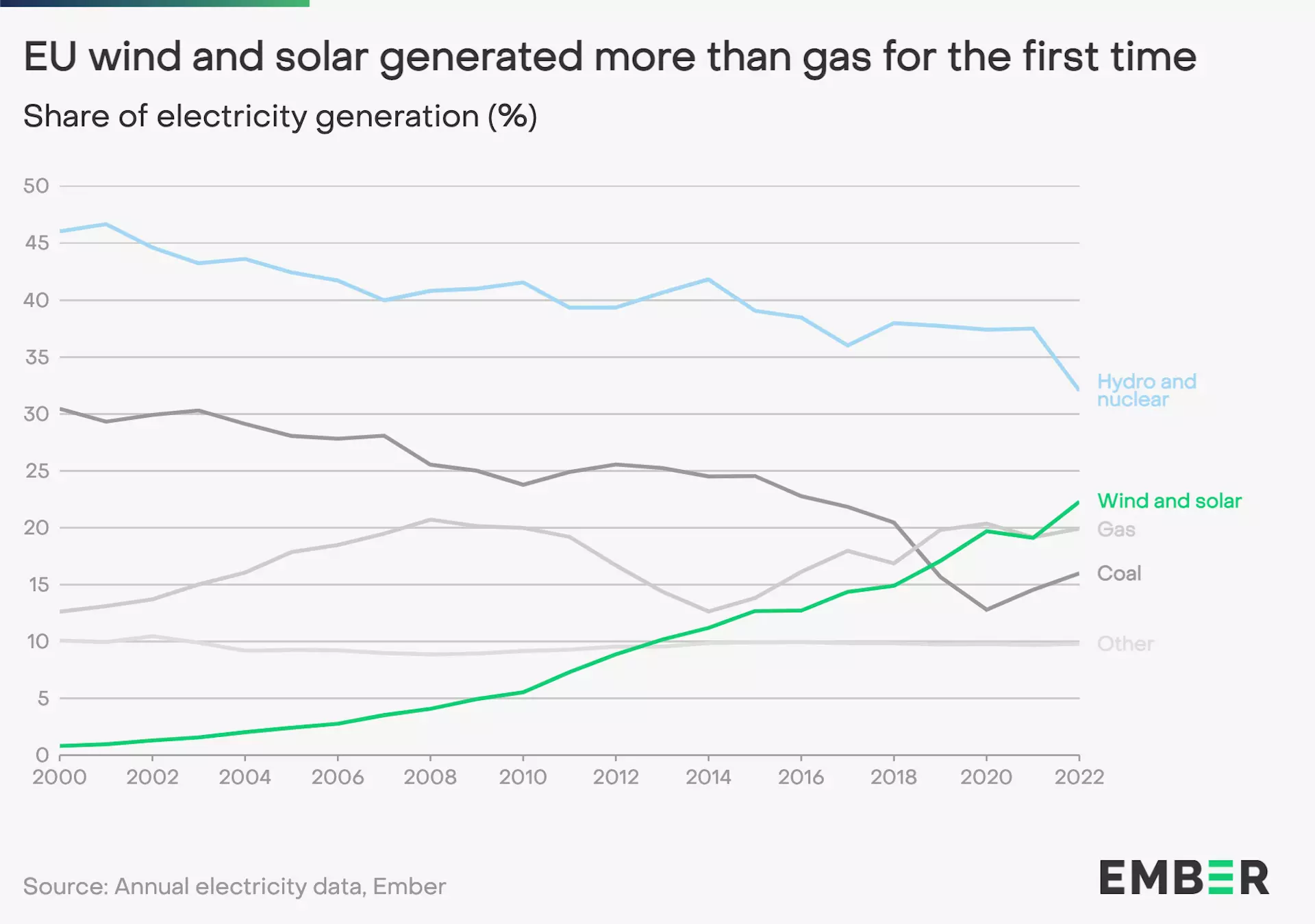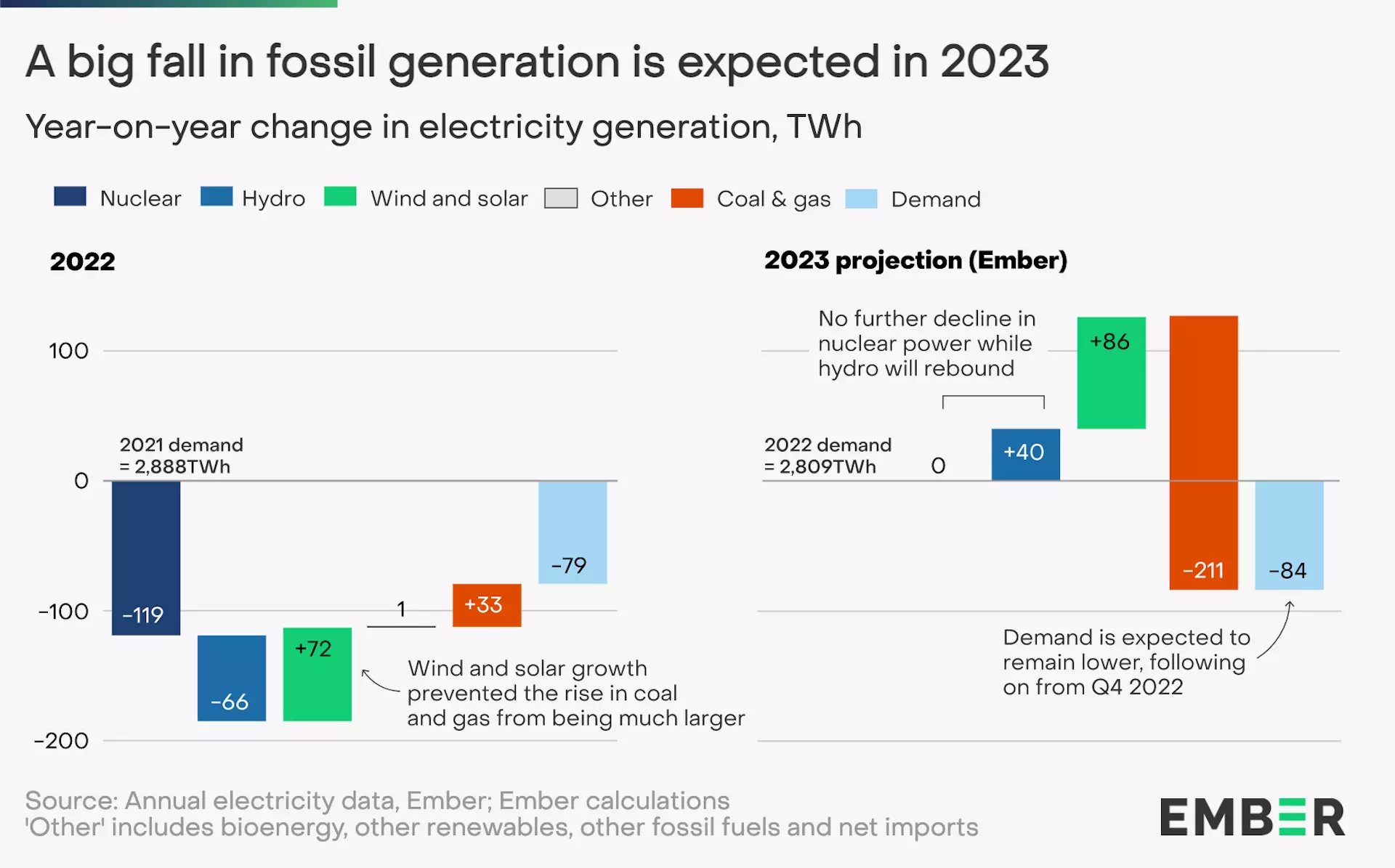https://www.lifegate.it/rinnovabili-gas-italia-libia
- |
- Prime Minister Giorgia Meloni and Claudio Descalzi of Eni were also in Libya to stipulate new agreements in the energy sector.Two fields are planned for an investment of 8 billion euros.
- Yet, according to the latest Ember report, renewables have overtaken gas in electricity production.And in 2023, fossils will drop by another 20 percent.
- It is clear that there are also other interests in the agreements with Libya.Among these, the management of migrant flows.
Eni and Giorgia Meloni's "energetic" tour in North Africa continues.After tightening agreements with Algeria, now it's Libya's turn.At the center of the contracts stipulated between Eni and the Libyan national unity government is an Italian investment worth 8 billion which focuses ongas extraction and production – then destined for Italy – at the Mellitah complex, in Tripoli, plus the construction of a carbon dioxide capture and storage (CCS) plant.
The Libyan agreements demonstrate how Italy has once again chosen to focus on fossil fuels, on gas in particular, taking refuge behind the reasoning that gas represents the only source of energy capable of guaranteeing energy security in the short term.Nevertheless the numbers describe a different reality:in Europe, in 2022, for the first time, generation from renewable sources has surpassed gas generation.In short, what is the point of transforming Italy into a "gas hub" when electricity production goes towards clean sources?It is clear that not only sustainability but not even security of supply is the objective of these agreements.

Fossil fuel production will collapse in 2023
Let's start from the energy context:the news of historic overtaking of renewables on gas emerges from the research center's annual study Ember, essential news to contextualize the "Mattei Plan", the government's bet on gas that is being talked about a lot these days.
The report reveals that in 2022, for the first time, generation from renewable sources, wind and solar (22 percent), surpassed gas generation (20 percent).But above all Ember also estimates that Electricity production from fossil fuels could fall by 20 percent in 2023, double the previous record in 2020.
According to estimates, the two fields in Libya on which Eni and Italy have bet should contain overall reserves sufficient to supply 8.7 billion cubic meters of gas per year for the next 25 years.But considering Ember's data, it means that Italy has bet 8 billion euros on a losing asset, not to mention that the two Libyan fields will be operational in three and a half years.
Solar avoided 10 billion in gas costs
According to Ember analysis, in 2022 Europe faced a triple crisis of the electricity sector:just as it was struggling to cut ties with Russia, its main supplier of fossil gas, it found itself facing the lower levels of hydroelectric and nuclear energy for at least two decades now, which has created a deficit equal to 7 percent of Europe's total electricity demand in 2022.
Renewables alleviated this deficit:the generation from solar is the one that recorded the fastest increase, with record growth of 24 percent in 2022 – almost double the previous record – which helped avoid 10 billion euros in gas costs.Twenty European Union countries set new solar energy records in 2022.
Of course, even there decrease in electricity demand helped reduce the deficit.The mild climate was a decisive factor, but cost pressures are likely to have played an important role, along with improvements in energy efficiency and citizens acting in solidarity to reduce energy demand in a time of crisis .
Coal is useless, we can say goodbye to it
The current energy context is also favorable for say goodbye to coal.First of all, because only one sixth of the nuclear and hydroelectric deficit mentioned above was covered by coal.This means that in 2022, coal generation increased by 7 percent but it could have been much worse:wind, solar and declining electricity demand have prevented a much larger return to coal.
More generally, coal generation throughout the Union it declined in all four final months of 2022, down 6 percent year-on-year.Although the EU imported 22 million tonnes more coal in 2022, it only used a third of it:“The shocks of 2022 have caused only a small ripple in coal power and a huge wave of support for renewables,” says Dave Jones, head of data insights at Ember.“Any fears of a coal recovery are now dead.".
The gradual elimination of gas will be seen in 2023
But the most surprising thing to emerge from Ember's report is that gas generation remained almost unchanged (+0.8 percent) in 2022 compared to 2021, despite record prices.Gas generated 20 percent of Europe's electricity in 2022, compared to 19 percent the previous year.AND things are about to change.
The latest industry indications suggest that Europe's transition to wind and solar will accelerate in 2023 in response to the energy crisis, while French hydro and nuclear will recover.As a result, Ember estimates that fossil-based electricity production could fall by 20 percent in 2023, double the previous record in 2020. Coal generation will decline, but gas generation will, which is expected to remain more expensive than coal until at least 2025, it will be the one that decreases most rapidly.
“Europe's energy transition emerges from this crisis stronger than ever,” added Jones.“Not only are European countries still committed to phasing out coal, but now they are also making efforts to phase out the gas.The energy crisis has undoubtedly accelerated Europe's electricity transition.Europe is racing towards a clean and electrified economy, and this will be fully visible in 2023.Change is coming fast and everyone needs to be ready."

Not just gas:in the agreements with Libya there is the migrant issue
In such a framework, no one would aim to become a gas hub for a continent that, numbers in hand, is betting everything on renewables.Nobody, except Italy.The government led by Giorgia Meloni, together with Eni CEO Claudio Descalzi, has already made two trips, first to Algeria and then to Libya, to define how much gas to extract from North Africa and how to transport it to Italy and Europe.
Gas is not only unsustainable from an environmental point of view but also from an economic one: as Proxigas explains, the newly formed Confindustria association that brings together gas companies (but not Eni) the transportation of natural gas from abroad to Italy involves on the one hand the emission into the atmosphere of a quantity of climate-altering gases, which on average is six times higher than that emitted by gas extracted on national territory, and on the other it is even more expensive:for every 1000 cubic meters of gas coming from abroad, 120 more must be extracted and consumed for transport.
It is no coincidence that the agreements between Italy and Libya on gas do not only include gas.Indeed, a lot of space has been dedicated to the theme of flows of migrants from the African coasts towards Italy.On this issue, Italy has the memorandum with Libya was renewed in view of the February deadline, which includes the delivery of five patrol boats.For years the so-called Libyan Coast Guard has been financed and trained by Italy and the European Union to reduce the departures of migrants from the Libyan coasts.
A arbitrary patrolling given that, as demonstrated on several occasions by several NGOs, the Libyan Guard helps whoever it wants, with often violent methods but above all too often it returns the people intercepted at sea to the traffickers and the managers of the migrant centres, where torture and rape are, unfortunately, systematic.In short, once again the fate of fossil fuels is linked to that of violated human rights.


